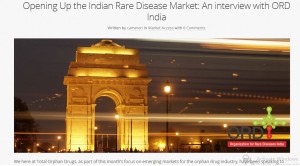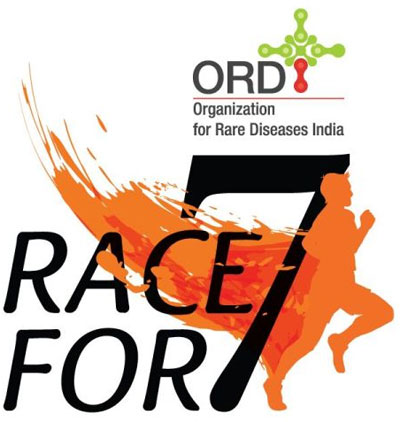 We here at Total Orphan Drugs, as part of this months focus on emerging markets for the orphan drug industry, have been speaking to Harsha K Rajasimha of the newly formed Organization for Rare Diseases India (ORDI).
We here at Total Orphan Drugs, as part of this months focus on emerging markets for the orphan drug industry, have been speaking to Harsha K Rajasimha of the newly formed Organization for Rare Diseases India (ORDI).
With a rare disease population estimated to be around 72,611,605 (more than the US and EU rare disease populations combined) the need for orphan treatments is huge, and with little in place so far, India represents a lucrative market to developers and pharma looking to expand their orphan operations.Rajasimha, one of the seven founders of the organisation, sat down with us to tell us a bit more about the current state of the orphan drug industry in India and the opportunities it holds: So, Dr Rajasimha, how many rare disease treatments are currently available in India?
In theory, close to 400 US FDA approved orphan drugs and about 80 EMA approved orphan drugs are available in India and world-wide. However, in practice, most of them are either not accessible to most patients in India or are unaffordable. It is ORDI?s mission and hope to make these and new approved orphan drugs easily accessible and affordable to patients with rare diseases in India.
Are there any financial incentives available to orphan drug developers looking to develop a treatment in India?
Currently, drug developers in India are receiving no formal incentives from the Government and hence are more focused on developing affordable drugs for more common diseases such as oral insulin, statins for preventing or slowing the progression of cardiovascular disease, vaccines and antibiotics for a number of preventable infectious diseases, etc.
Hence, patients with rare diseases in India have to rely on imported drugs from western countries which makes these treatments (even when available) unaffordable. ORDI aims to work between the Government of India and the Pharma/Biotech/Diagnostic industry to enact an Orphan Drugs Act (ODA) that will create incentives for orphan drug developers. We also need the Government to create a framework that is conducive to enabling the manufacturing of orphan drugs in India.
What financial assistance can rare disease patients expect in order to cover the high cost of orphan drugs?
The healthcare system in India is mostly self-funded by the patients. This restricts the affordability threshold for drugs and diagnostic tests to around 25 thousand rupees (~400-500 USD) per instance or about a lac rupee (~1600-2000 USD) per year on recurring expenses for most patients. The costs of most available
https://healthsavy.com/product/celexa/
orphan drugs are significantly higher than this affordability range requiring the need for financial assistance. Patients look for patient foundations, other non-governmental organizations, and charitable access programs offered by certain Pharma companies to cover these costs.
What do you see as the three biggest hurdles to improving patient access to orphan drugs in India?
Awareness among doctors, patients and other stakeholders of rare diseases, relevant clinical trials and orphan drugs.
Affordability and Accessibility (easy import and distribution) of orphan drugs in India. Orphan drugs are expensive as they target a small subpopulation of patients and given the need to recover costs of R&D. Since the target population is sparsely distributed geographically, making them and the doctors who care for them, aware of the drugs can reduce the costs associated with marketing and distribution.A comprehensive nation-wide registry of rare disease patients can enable dissemination of information about the availability and accessibility of orphan drugs to patients suffering from specific rare diseases.Enactment of the Orphan Drug Act by the Government of India. Without assurance of marketing exclusivity, IP rights and other financial incentives, the orphan drugs industry is unlikely to succeed in India. The Pharma community in India has made several attempts in the past to seek enactment of ODA and ORDI aims to strengthen this voice.
What advice can you offer to foreign pharma and biotechs looking to access the Indian orphan drug market?
All foreign pharma, biotech and diagnostic companies need to unite together and convey an amplified message to the government agencies. ORDI will be looking to team up with the Indian Pharmaceutical Association (IPAPharma), the Organization of Pharmaceutical Producers of India (OPPI) and other Pharma organizations to swiftly convey the needs of the orphan drug market to the Government. ORDI believes that collective voices are likely to be heard better and acted upon faster by the Government. We seek and invite industry collaboration to overcome the common regulatory, financial and other barriers for the orphan drugs market in India.
Could you tell us a bit about any projects or collaborations you are currently working on?
We are in the process of establishing the ORDI corporate council which will be composed of Pharma/Biotech/Diagnostic companies in India. We have received sponsorship and membership contributions from two diagnostic companies already and have received commitment from a number of Pharma companies to support ORDI programs such as the rare disease care coordination center which includes a nation-wide helpline.
https://www.orphan-drugs.org/2014/03/20/opening-indian-rare-disease-market-interview-ord-india/#sthash.uWrp1MMz.dpbs
 We here at Total Orphan Drugs, as part of this months focus on emerging markets for the orphan drug industry, have been speaking to Harsha K Rajasimha of the newly formed Organization for Rare Diseases India (ORDI).
We here at Total Orphan Drugs, as part of this months focus on emerging markets for the orphan drug industry, have been speaking to Harsha K Rajasimha of the newly formed Organization for Rare Diseases India (ORDI).


